Pumpkin math activities are a fantastic way to blend the excitement of the fall season with critical early math skills. This pumpkin measurement activity stands out for its simplicity yet abundant learning opportunities. Preschoolers will get to practice measuring pumpkins, estimating their circumference, and ordering real pumpkins by size.
This is one of our favorite fall activities to add to our preschool centers. Dive into some playful pumpkin math with this engaging pumpkin measurement activity. Who knew such a simple activity to lead to such deep learning?!
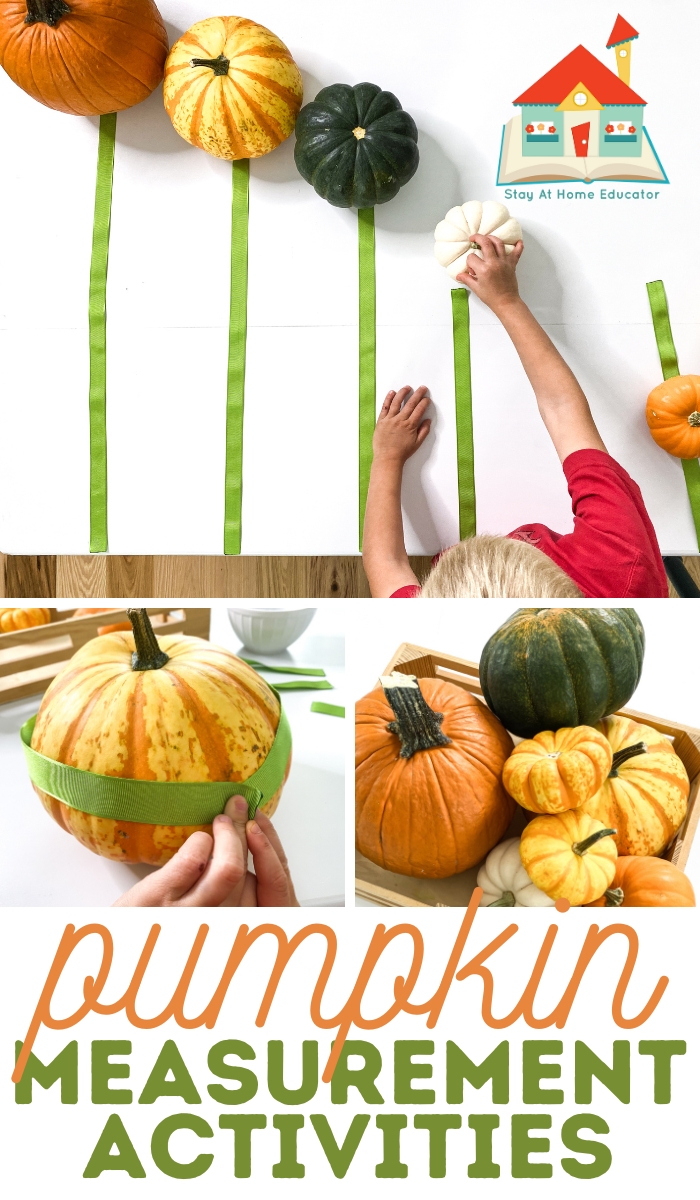
Engaging in pumpkin math activities is a brilliant method to combine the fun of the festive fall season with essential early math abilities.
This hands-on activity requires children to use various lengths of ribbon to measure the circumference of a pumpkin. It’s an interactive and fun way to introduce concepts of measurement to preschoolers. And, it’s also part of our big list of math activities for preschoolers.
They learn to compare lengths of the ribbons, understand bigger and smaller concepts, and get a practical understanding of what ‘circumference’ means.
Beyond just math skills, this activity also aids in the development of fine motor skills. As the children maneuver the ribbons around their selected pumpkin, they are unknowingly practicing their grip, hand-eye coordination, and dexterity.
So, not only does this pumpkin measurement activity provide a hands-on learning and practical learning experience for preschoolers but also plays a big role in their overall growth and development.
What is Measurement in Early Childhood Education
Measurement in early childhood education refers to the process of teaching young children how to understand and compare the size, length, weight, and capacity of objects.
This can be done through various hands-on activities that involve measuring items with non-standard units (like blocks, hands, footsteps). It’s a fundamental mathematical concept that helps children develop spatial reasoning, problem-solving skills, and an understanding of the physical world around them.
Measurement skills are also closely related to estimation and graphing skills, too. Our Ultimate Guide to Teaching Measurement in Preschool covers this in more depth.
How to Introduce Measurement
Start with simple, tangible examples that children can physically interact with.
For instance, compare the lengths of different toys or use blocks to measure the height of a table.
You can also introduce non-standard units of measurement like snap cubes, blocks, or even pieces of ribbon like in this activity. Make sure to use repetitive language to reinforce the concept – phrases like “shorter than”, “longer than”, or “as tall as”.
Like all math disciplines, teaching measurement should be done sequentially and systematically. This means that cherry-picking activities will not lead to deep knowledge. Rather, the highest amount of success will be met by using measurement preschool lesson plans, like our Daily Lessons in Preschool Measurement unit.
Pumpkin Measurement Activities
The pumpkin measurement activity is an engaging, hands-on learning experience designed specifically for preschoolers. It provides a practical method for introducing the concepts of measurement.
Plus, this activity is perfect to leave out in your science preschool center, too.
Materials
For this activity, I recommend using real pumpkins because then preschoolers can experiment with weight, too. However, if you choose reusable pumpkins, this decorative pumpkin set comes with pumpkins of various sizes that will work well, too.
The Set Up
If using fresh pumpkins, be sure to wash them before use, taking care to remove any dirt. Set aside.
Then, prep the ribbon lengths.
Take a piece of ribbon and wrap it around a pumpkin and cut to length. Use Fray Check to seal the fibers to the ribbon to keep them from fraying. Set that length of ribbon aside, and repeat the process until there is a corresponding length of ribbon for each pumpkin.
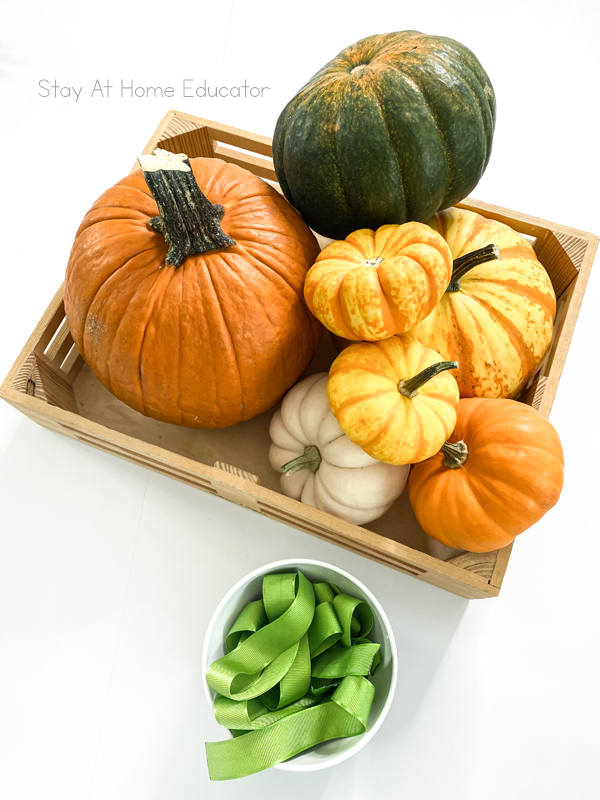
Pile the pumpkins in a wooden tray and the ribbons in a small bowl. Then invite your preschoolers to join you in exploring some interesting measurement concepts!
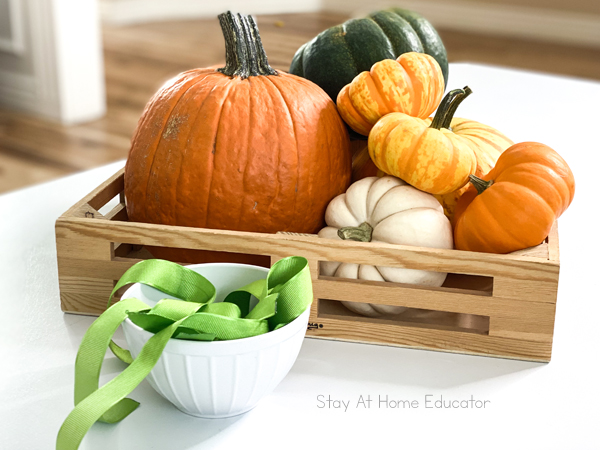
Estimating Pumpkin Circumference
The first pumpkin measurement activity was to estimate the pumpkin circumference without measuring.
Start by allowing your preschoolers a little time to play with the ribbons, getting them all out at once.
As they play for a few minutes, make general observations about the length of ribbons, commenting on how some are long and some are short. It’s important that that preschoolers notice they are not all the same length. Do the same with the pumpkins.
Now, select a pumpkin and invite the preschoolers to estimate, without measuring, which ribbon will fit around the pumpkin. Make the match and set aside.
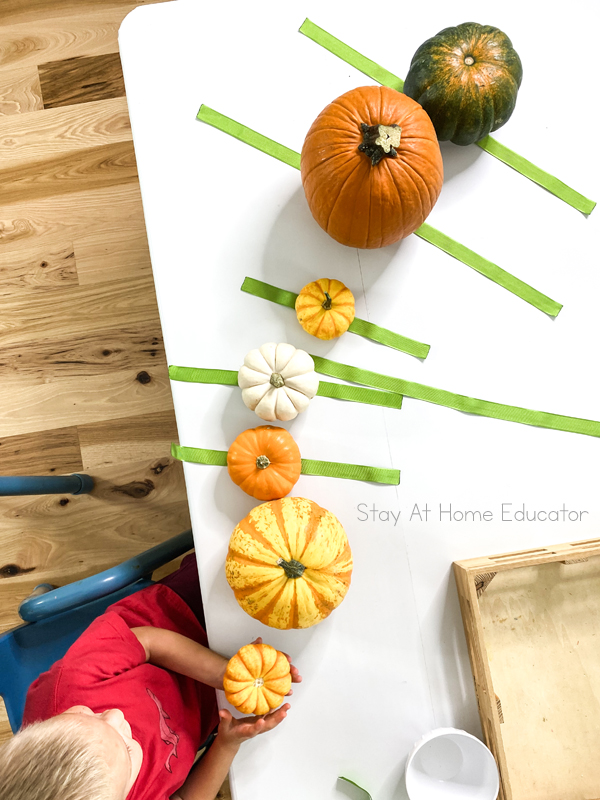
Soon, you will have sets of pumpkins and ribbons, like in the photo above. Not all them matches will be correct. But the next step is to check their work.
Pumpkin Measurement
This part of the measuring activity can be done with or without the first activity about estimating and matching the ribbons.
Now it’s time for the preschoolers to use the selected ribbon to wrap around the pumpkins to check if their estimate was correct or not.
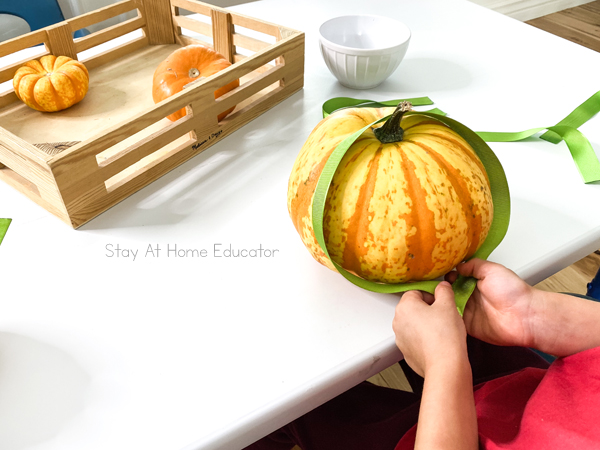
The preschooler in the above photo discovered that the ribbon length and pumpkin didn’t match. The ribbon was too small to go completely around.
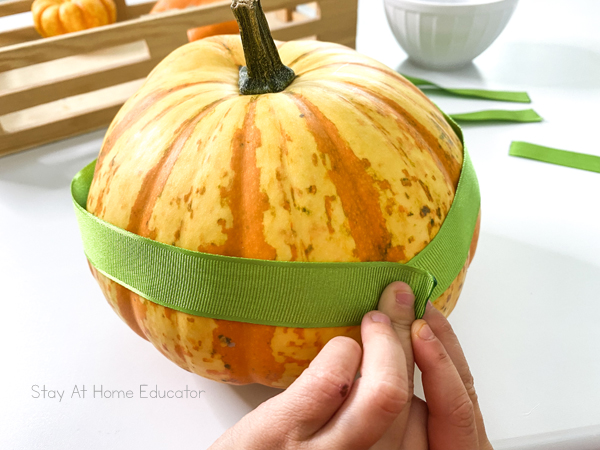
This ribbon was a better match. When doing this activity, it’s important to teach the preschoolers how to properly use the ribbon to check the circumferance.
The ribbon should always be wrapped around the middle part of the pumpkin. And the ribbon length should be near the exact size, but allowing for some human error.
Ordering by Size
The next pumpkin measurement activity we did was to order the pumpkins by size.
After matching all the ribbon lengths with the correct pumpkins, we then arranged the pumpkins from largest to smallest, using the ribbons as the definitive unit of measurement.
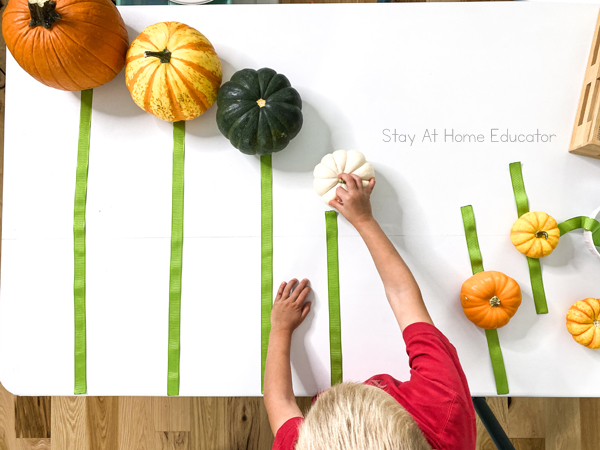
Ordering the ribbons and pumpkins by size didn’t come as naturally to the preschoolers as I had thought it would. The important piece they were consistently missing was lining up the ribbons so that they all started at the same place.
We ended up using the table edge as the start, and carefully laid out each ribbon. Then, we placed the corresponding pumpkin at the top of the ribbon.
This lead to discussions about how some pumpkins looked like they were the same size, but the measuring ribbon length would show the differences.
Measuring Pumpkin Weight
If you are using real pumpkins, you can expand on this activity by using different scales to weigh the pumpkins. Sometimes you’ll find that what appears to be the biggest pumpkin doesn’t weight the most. that’s a huge revelation for preschoolers!
Here are the classroom scales we have in our science center.
Pumpkin Math Activities for Preschoolers
We love studying a pumpkin preschool theme in October. It’s always so fun and engaging for young children. Here are some pumpkin activity that teach other math skills.
- Pumpkin Seed Counting and Craft
- Pumpkin Shape Mats
- Pumpkin Math Sensory Bin
- Pumpkin Count & Graph Worksheets
- Pumpkin Counting Cards
Measurement Activities for Preschoolers
Exploring measurement concepts can be really enjoyable and fun for preschoolers. Try some of these other favorite measuring activities.
- Layered Pumpkins Measurement Craft
- Ice Cream Cone Measurement Cards
- Valentine’s Size Sequencing Activity
- Free Measurement Task Cards
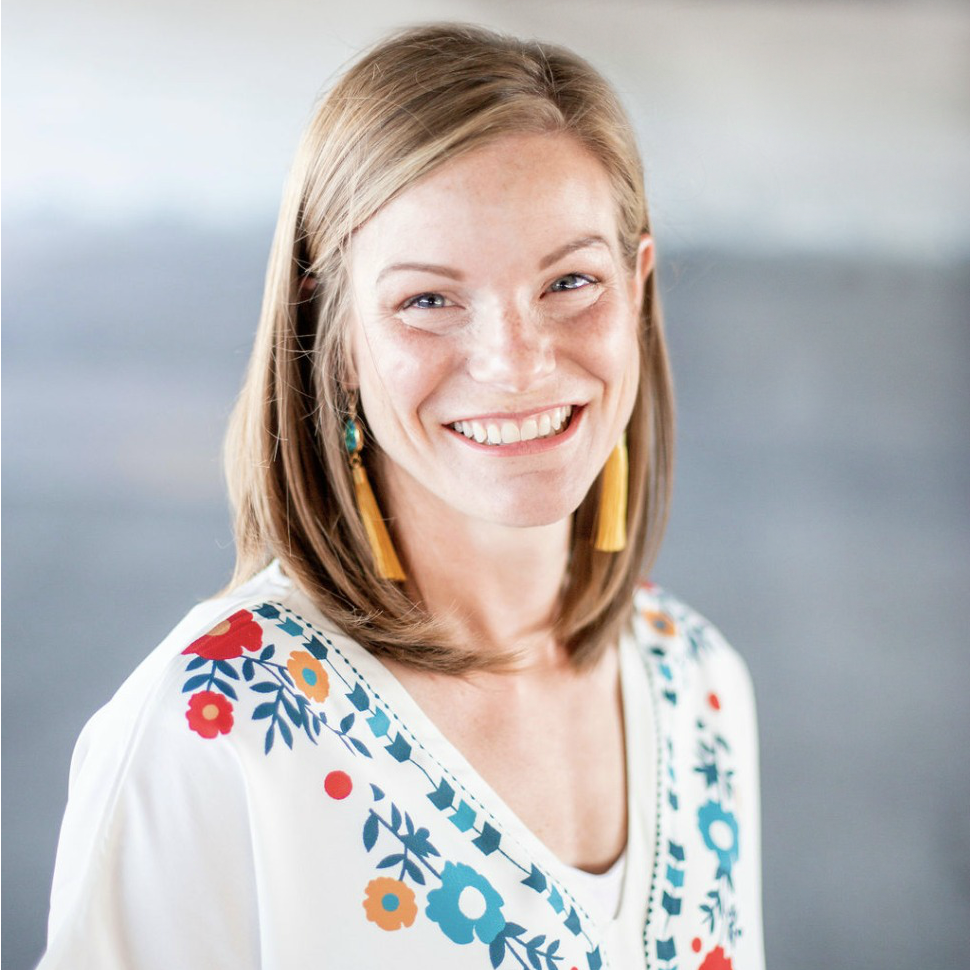
I’m Sarah, an educator turned stay-at-home-mama of five! I’m the owner and creator of Stay At Home Educator, a website about intentional teaching and purposeful learning in the early childhood years. I’ve taught a range of levels, from preschool to college and a little bit of everything in between. Right now my focus is teaching my children and running a preschool from my home. Credentials include: Bachelors in Art, Masters in Curriculum and Instruction.
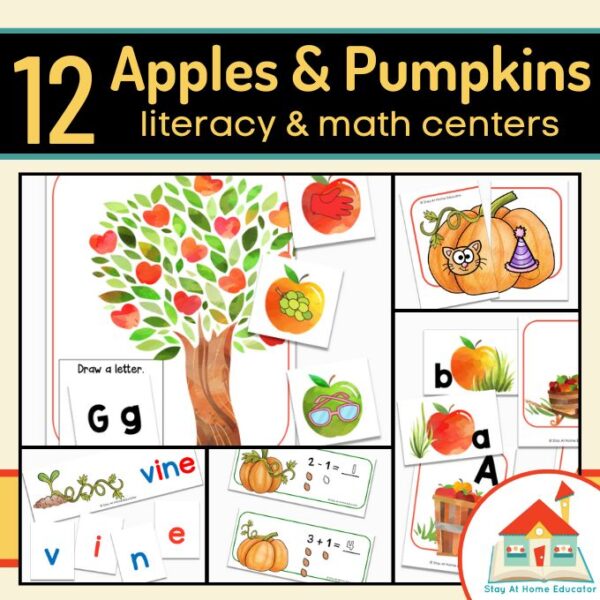
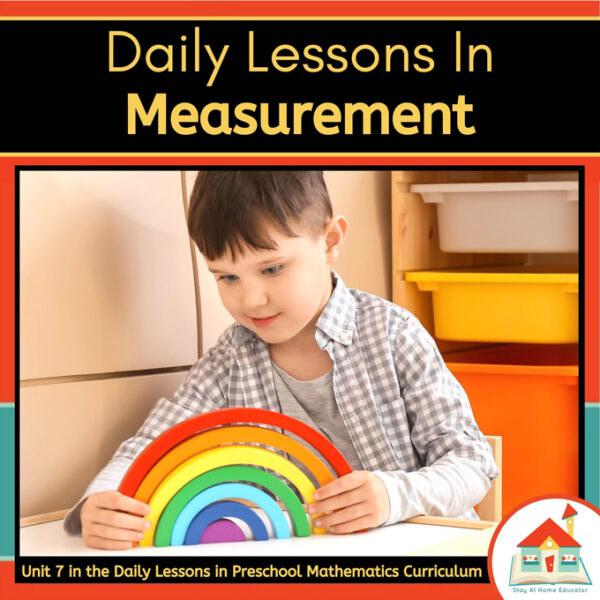

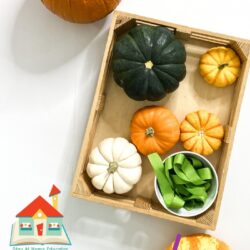
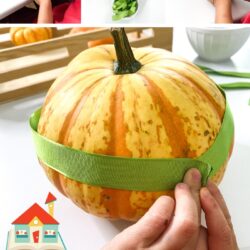
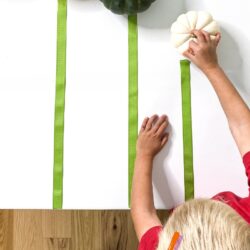
Leave a Reply